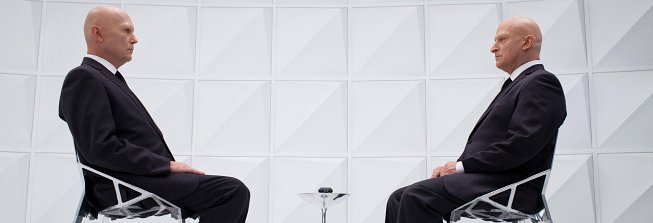The end is here. After five years of ups and downs (more downs than ups recently, unfortunately), ‘Fringe’ aired its two-part series finale on Friday. For as negatively as I’ve felt about the show this season, I’m surprised to admit that the finale actually ties a lot of things together. But does it bring the series to a fully satisfying conclusion? That much is still up for debate.
The finale is broken into two episodes, called ‘Liberty’ and ‘The Enemy of Fate’. In the first, Broyles informs the Fringe team that the young “anomaly” Observer named Michael has been taken to Liberty Island for interrogation and experimentation. (In this timeline, the Statue of Liberty has been half dismantled.) Because the boy is the lynchpin in Walter’s plan to defeat the Observers, he must be rescued at all costs. To get around the heavy security on the island, Olivia concocts a plan to cross over to the alternate universe, go to Liberty Island there, cross back while inside the building, rescue Michael, then repeat the process to get him out through the alternate universe and back again.
[Question: If Michael is so dangerous to the Observers because he has all of their intellect plus human emotions, why doesn’t he ever show any emotions?]
Of course, the portal to the alt ‘verse was closed last season, and Olivia no longer has her magical Cortexiphan powers that allow her to cross over on her own by tapping her shoes and wishing really hard. The solution to this, naturally, is for Walter to shoot massive doses of Cortexiphan directly into her brain stem. Just like that, Olivia regains her powers, and can cross over in a flash of twinkling rainbow sparkles. (Yeah, it’s just as lame as I make it sound.)
On the other side, Olivia meets up with Fauxlivia and Lincoln, who are now twenty years older (not having been trapped in amber like Olivia was) and married with kids. Things are pretty nice in the alternate universe. The Observers never invaded there. The world has stabilized since the rifts closed. Chelsea Clinton is running for President and Warner Bros. is remaking ‘Harry Potter’. (Hey, the first two movies sucked and need remaking.)
Meanwhile, as Olivia enacts her rescue plan, Donald/September gets to work building the time machine, which involves a lot of Bunsen burners and bubbling test tubes, because that’s science. Since he’s still missing a critical piece, he enlists the help of a friendly Observer named December, and this is where some of the holes in this season’s storyline start to get filled in.
One of my biggest gripes about the season has been the way that the formerly-passive Observers were suddenly turned into a race of evil time-traveling Nazis. It turns out that the initial group of twelve Observers (each named after a month) were a scientific expedition sent back from the future to… well… observe, and report on the past. They were not aware of the invasion plans. This helps to explain the drastic change in the way the race was depicted. As they spent more time in the 21st Century, the first batch of Observers started to be affected by humans. The dormant emotional centers in their brains were stirred, and they developed feelings of sympathy. A similar thing is happening to the evil Observers, which is why Windmark is so clearly consumed with emotions like jealousy and hatred.
In the second episode, Windmark catches on that Broyles is working with the resistance. Broyles allows himself to be captured to buy the team some time.
Peter finds a tape that Walter recorded with a goodbye message. In it, Walter says that he’s going to bring Michael to the future to stop the Observers from ever being created. Because “Nature abhors a paradox,” that means he’ll be deleted from the timeline at the moment of the previous invasion in 2015. The pseudoscience here makes absolutely no logical sense at all, but whatever. The point is that if Walter goes to the future, Peter will never see him again. They share an emotional moment together.
Windmark catches and kills December, and steals the part that Donald needs for the time machine. Astrid comes up with a new plan to hijack one of the Observers’ shipping lanes and use that as the time portal they need. In other words, the entire season’s storyline about collecting parts and building a time machine came to nothing, because they didn’t need it after all.
Walter and Astrid share a nice moment when she finds Gene the cow in the amber in the lab, and Walter tells Astrid that she has a beautiful name.
Walter gives Peter some anti-gravity bullets that he’s invented, which will cause the Observers to float off into the sky when they’re killed. When Peter asks what the point of that is, Walter explains, “Because it’s cool.”
This leads to a raid on Observer headquarters in which the team utilizes a lot of classic Fringe events (nasty parasites, face-melting gas, etc.). This would probably be more satisfying if they hadn’t already done the same thing earlier in the season. Then we have a big but rather tepidly staged shootout around the time portal. Windmark beats up Peter until Olivia uses her telekinetic powers to crush him between two cars. Donald attempts to take Michael through the portal so that Walter doesn’t have to go, but he gets shot in the chaos, and Walter has to go anyway.
As soon as Walter and Michael jump through the portal, time resets and we’re brought back to the day of the invasion in 2015. The Observers never appear. Etta is never taken. Everyone is happy. Peter returns home and receives a letter in the mail from Walter with a drawing of a white tulip on it.
Again, this call-back to a classic episode might have been more affecting if a previous episode this season hadn’t already made the same reference.
All in all, the series finale is better than I expected, even if it has some lame parts. The climax and final scene feel especially limp, but the episodes have some good character moments and attempt to plug some of the season’s plot holes. I also appreciate the return to the alternate universe. The way that storyline had been written out and forgotten this season as if it had never been important left a really sour taste in my mouth all year.
I’m still not sure that the finale completely makes up for my disappointment with the rest of the season, but I don’t regret sticking with the show to the end. How do other ‘Fringe’ fans feel about this? Did you like the finale?





Bryan
I don’t have quite the negative view of season five that you do, but as someone who’s watched from day one – I enjoyed the finale. I appreciated the explanation of the seemingly radical shift in the behavior of the Observers. I really enjoyed getting an (all-too brief) look back at the alternate universe again. Most of my favorite episodes focused on the differences between the two “sides.” It also gave the actors a very creative way to play the same characters in a very different way.
I will admit to getting choked up at the emotional moments between Walter and Peter. That video and the discussion that followed it really resonated with me. I loved how Walter felt that basically all of his time with Peter had been a gift (the whole concept of “stolen time”). There were also a couple of nice moments between Walter and Astrid.
At the beginning of the series, Walter was made out to be a “mad scientist.” With his sacrifice to take Michael to the future, I think they gave him the final piece of his redemption. All in all, I was pretty happy with how things played out. My only complaint is that I would have liked a few more scenes after the “reset” to see how the world continued on.
Mark
On Michael behavior, it is said on a couple of occasions that he is highly evolved and to me that means that he has developed another way to communicate. It’s like trying to talk over radio waves but no one else has a receiver is the best analogy I can think of.
I too also felt that the season’s storyline was rushed and little ill-conceived but I really believe that to give the show the ending they had in mind the writers had to jump ahead a season or two of story since they knew they had one season left and a short one at that.
Which could also be why last seasons storyline brought on the disconnect between universes and the culmination of what Bell was trying to do.
What could have been — the fates of tv ratings:(
I am another diehard fan that was on board from the first episode and like anything that comes to an end I am sad and am filled with mixed emotions. I will miss the members of Fringe division. All the fond memories of their weird cases, alternate universes, the observers, the machine, and so much more.
Jason
My feelings on the finale are more positive than negative, I think.
There were parts of this season that did feel almost rushed, or at least not quite “complete”, but what we learn in the finale accounts for a good deal of that.
I still get the sense that the shakier aspects of the season may be directly related to its shorter length. I seem to remember reading somewhere, years ago, that there was an overall plan, in whatever form, for the whole series and that it was geared around a 7-season run. When the 5th year renewal finally came through (how late did the renewal come, by the way? I want to say it took a long time, but I don’t remember any more) and for a half season at that, it was probably necessary to go through that overall plan and start cutting away whatever they could. Maybe too much?
I wonder (and this is just me, I have no basis for this) whether the main plot points of the season finale (resetting time, Walter in the future, the origin of the bad Observers, etc.) were the original target all along, but the means of getting there got changed and shortened and compacted a little too much. It does seem like way too much of the 13 episodes we got for season 5 dealt with recovering tapes and tracking down pieces of the plan, all of which seemed a little bit anticlimactic when it came to it in the end. (They did still use the magnet and the Observer’s beacon cylinders, to aim the wormhole or something along those lines. So, there’s that at least.)
Is anyone familiar with the behind the scenes story of “Babylon 5”? Its almost-too-late renewal for the (always planned) fifth and final season necessitated ever larger adjustments to the story line, and then a sort of floundering period in the early fifth season (again, my own opinion) before it catches its momentum again. I can’t help but look at Fringe the same way, and wonder how different things might have gone had there been two more, or even one more, full 22-episode season. Alas.
Other impressions: I too would have liked a little more of an epilogue after the reset, just to show how things ended up. I thought Walter’s paradox explanation wasn’t nearly clear enough (even after running that scene three or four times) especially considering how important his choice was supposed to be. I would also have really liked a wider reveal of the bad-Observer plan… they picked that era for its 99.999% chance of success, but success at what, exactly?
In the end, I’ll miss Fringe, but I’m also very glad it went out on (mostly) its own terms instead of disappearing a year or two ago.
Fishguy
While the series finale was emotionally satisfying, there is a MAJOR plothole that I just cannot reconcile:
If the plan worked, and mankind never became the observers as we came to know them, it does not make sense that the observers would have ceased to exist only at the time they traveled back to invade.
September would never have existed either – to save Walter & Peter when they fell into the icy waters. So no adult Peter – in either universe, no cortexiphan trials, no relationship between Peter & Olivia, and no Etta.
I would have been happier with a time-paradox ending in which the we find the characters in a never – ending time loop, continually resetting the timeline to how things were in the beginning of the series (ie- it should have ended with Walter back in the sanitarium in 2008 – A “La Jette”/”Twelve Monkeys” sort of thing.)
Josh Zyber
AuthorYou’re exactly right. The writers clearly missed this paradox, which just goes to further suggest that this storyline was not the series’ planned end game all along.